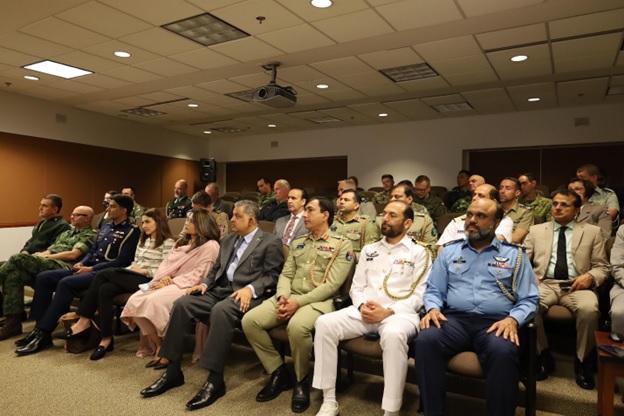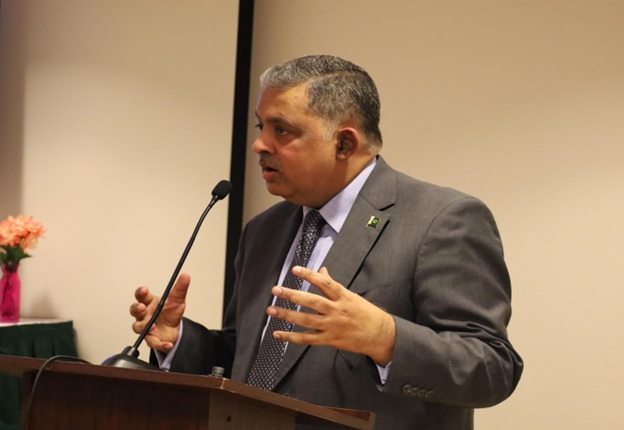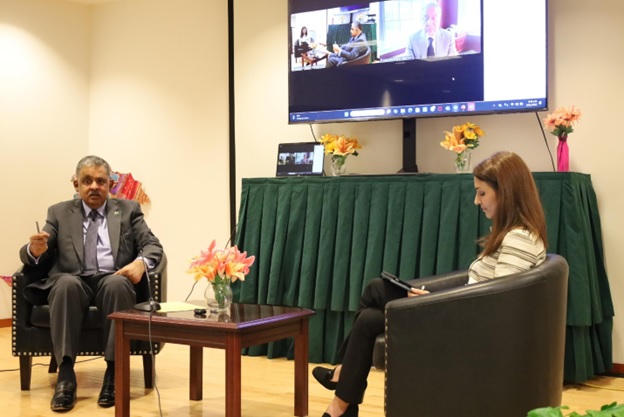


Pakistan Embassy Hosts High-Level Dialogue on Regional Dynamics Covering Afghanistan
By Elaine Pasquini

Washington, DC: Military representatives from the Washington Association of Military Attachés, embassy officials, regional security analysts and scholars with a focus on Afghanistan gathered at the Embassy of Pakistan on May 21, 2025, for a panel discussion titled “Regional Dynamics Covering Afghanistan.”
The panel featured a distinguished lineup, including Ambassador Munir Akram, former Permanent Representative of Pakistan to the United Nations; Ambassador of Pakistan to the United States Rizwan Saeed Sheikh; and Dr Amira Jadoon, an Afghanistan expert from Clemson University, who moderated the discussion.
In his remarks, Ambassador Sheikh emphasized the complex security dynamics of South Asia and the impact on Pakistan, which continues to be the frontline state in global combat against terrorism emanating from Afghanistan.
“Pakistan is directly impacted by the security situation, not only in South Asia but in the broader Middle East region,” Ambassador Sheikh stated. “Our region doesn’t require episodic attention; we need the international community’s consistent support as the frontline state in the global combat against terrorism.”
In addition, he highlighted Pakistan’s sacrifices and unwavering commitment to help stabilize the region.
“We are, as we speak, lifting dead bodies on a regular basis in the global combat against terrorism,” the ambassador said. “The smallest coffins are the heaviest to carry, and we have carried too many of those in this war.”
Ambassador Sheikh also stressed the importance of regional peace as a foundation for economic progress, noting geoeconomics is his country’s new foreign policy focus. “Pakistan has significant geographic connectivity to Central Asia and Europe, and in the absence of peace and stability, our economic potential cannot be materialized,” he noted. “The thrust of Pakistan’s foreign policy has pronouncedly and deliberately shifted to geoeconomics.”
Highlighting Pakistan’s long-term vision for regional integration and development, Ambassador Munir Akram afforded a detailed overview of the security situation in the region.
“We believe that the connectivity projects through Afghanistan and its economic development will be the best peace dividend that we can achieve through normalization in Afghanistan,” he said.
Ambassador Akram also underlined the growing threat posed by Tehreek-i-Taliban Pakistan (TTP) and the alliances it has created in the region.
“The TTP is emerging as an umbrella organization with various other terrorist groups present in Afghanistan joining under its ambit in order to seek protection for themselves,” he noted.
“Addressing the terrorist threat from Afghanistan is in the interest of Afghanistan itself, the region and the global community,” Ambassador Akram argued, while characterizing India as a spoiler not interested in normalization in Afghanistan and certainly not in Pakistan.
Earlier in the program, Brigadier Irfan Malik, Defense Attaché at the Embassy of Pakistan, provided a comprehensive briefing on the evolving security situation in the region.
In conclusion, Ambassador Sheikh expressed his sincere appreciation to the participants for contributing to the “productive and informative” exchange of ideas and perspectives on this important subject.
(Elaine Pasquini is a freelance journalist. Her reports appear in the Washington Report on Middle East Affairs and Nuze.Ink.)

